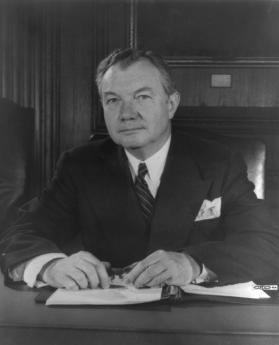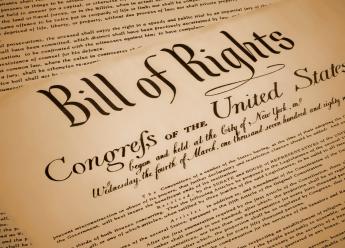Related Topics
...Ratification, Bill of Rights and Other Amendments
The 1787 Constitution lacked a Bill of Rights. Few except Madison himself were opposed to adding one, but many other delegates would have failed election without promising it. Negotiations at the Convention had proved so excitingly innovative that time ran out before the Convention had to adjourn with only a promise of a Bill of Rights, first thing.
..The Constitution
Our Constitution was not a proclamation written by a convention. It was a negotiated contract for uniting thirteen sovereign independent states. Nothing like that had ever been done voluntarily, and few nations have matched it in two hundred years, even with the use of force.
Government Organization
Government Organization
Customs, Culture and Traditions (2)
.
...Pending and Later Amendments
New topic 2012-08-01 19:06:55 description
Creating the European Union: Forces and Factors
New topic 2013-11-19 20:53:10 description
Right Angle Club: 2015
The tenth year of this annal, the ninety-third for the club. Because its author spent much of the past year on health economics, a summary of this topic takes up a third of this volume. The 1980 book now sells on Amazon for three times its original price, so be warned.
Euro unification
New topic 2015-02-08 19:47:28 description
Appealing the Constitution to a Higher Authority

|
| Justice Robert H. Jackson |
According to Justice Robert H. Jackson, "We" (The Supreme Court) "are not final because we are infallible, we are infallible because we are final." Scoop Jackson was the last Justice who never went to college or graduated from Law School, so his viewpoint concentrated on the practical outcome of a situation. In fact, the father of our constitution, James Madison, was learned in the history of many constitutions, and was well aware of allusions to divinity in the construction of our governing document, particularly when the sources of strong beliefs couldn't be grounded in evidence. However,the Age of Enlightenment was highly religious, so they gave credit to divine guidance when they really were imitating the Legal profession.The lawyer's system of progressive appeal to a hgher court of appeals was a very clever adaptation of recognition that most problems are pretty simple andcan be handled without much training.The Constitution is an attempt to reconcile our culture to the needs of government and the revelations of controversy. Composed by Enlightenment rationalists within a highly religious environment, the Founding Fathers were careful to use the metaphors of Religion, even though many were personally skeptics about the substance. Indeed, the Penman of the Constitution who ultimately wrote most of the words was Gouverneur Morris, a flagrant libertine. It had been the tradition of Constitutions to describe their culture by allusion to epic poems, drawing inferences about Right and Wrong from what had subsequently happened to ancient heroes after similar situations unfolded. Some would put the plays of Shakspere in that role in 1787, but the evidence is stronger for Roman writers, like Cato and Cicero. In my own view, this leap of faith was only divine in the sense it was a one-way street. A citizen might try to emulate the ancients, but appealing back to them was not likely to work.
Although the Constitution can be viewed as bridging a gap between Culture and Common Law, or perhaps as placing a guardhouse between them, this relationship is not spelled out and therefore, in theory, might be changed. Other cultures, perhaps the native Indian, or the Catholic Church of Central Europe, might be substituted, or other legal structures resembling the Napoleonic Code might serve on the opposite side of the bridge. These substitutions were a legal possibility, but there is little doubt the American leadership intended for an Anglo-Saxon culture, linked with Francis Bacon's legal system, to prevail under a distinctively American flag. Because of our debt to France for then-recent assistance, there was once the possibility of French coloration to our culture, but the excesses of the French Revolution soon ruled that out. Some modern observers have capsulized the scene: First, we got the British to help throw out the French in 1754; and then in 1776, we got the French to help us throw the British out. Both our allies thought we played their game, but we were playing our own. The new Constitution specified no laws, but with little doubt the Framers intended the states to adopt British Common Law without the infelicity of saying so.

|
| Bill of Rights |
And then there is the Bill of Rights. Madison had great faith in the ability of structure (separation of powers, term limits, etc.) to command predictable outcomes, and initially resisted any need for a Bill of Rights. But the Ratification Conventions in the states showed him the need to yield. The First Congress soon enough confronted over a hundred proposed rights in petitions from the states, especially the four big ones. If anyone else had been in Madison's position, our Bill of Rights would resemble the European one today, fifty pages long and growing. That outcome would have greatly weakened the Legislative branch since after protests about Mother Nature subside, the legal fact emerges that Rights are merely laws which no majority can overturn. They might even be characterized as a contrivance for transient majorities to promote the permanence of their viewpoint.

|
| The Founding Fathers |
But they are not the only contrivance in politics. Enshrinement of the Founding Fathers elevated their political positions into near divinity, whereas debunking the Founders personally undermines their symbolism as statues and myths. There was too much of this during the romance period of the Nineteenth century, but also in von Ranke's later marginalization of History into mere scholarship and footnotes, which was a reaction to it. The Founding Fathers themselves now supplant Achilles and Cincinnatus in our lexicon, and we have little choice but to accord more weight to their original intent in the Constitution, than to contemporary reasonings. Indeed, we are forced to acknowledge more similarity between George Washington's fictitious cherry tree than to his relations with Peggy Fairfax, when we interpret his thundering "Honesty is the best policy" in the second inaugural address. It is admittedly a difficult choice, but Justices now need to consider what his audience widely believed was his original intent, more than what later archeological discoveries uncover. Justice Scalia is correct in placing more weight on the original intent of the Founding Fathers than contemporary reactions to the same words. But in occasional conflicts between myth and reality, it seems safer to consider what the audience then widely believed, than what modern audiences would guess at.
Originally published: Thursday, April 02, 2015; most-recently modified: Thursday, August 01, 2019